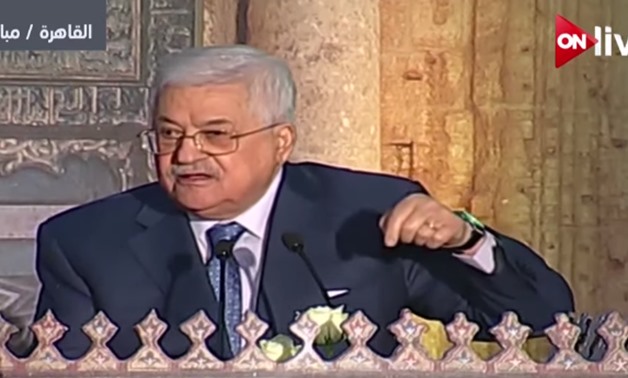
Palestinian President Mahmoud Abbas during a conference on Jerusalem in Cairo Jan. 17, 2017 - YouTube still from On Live
CAIRO – 17 January 2018: Muslims and Christians were urged by Palestinian President Mahmoud Abbas on Wednesday to visit Jerusalem en masse to break the Israeli “siege” imposed on the Arab inhabitants in the ancient city.
In a conference held in Cairo to denounce the U.S. decision that Jerusalem is the Israeli capital, Abbas labeled the fleeing of Palestinians in 1947 and 1967 following brutal attacks by the Israelis “an idiocy” that will not be repeated, and he called on Arabs to show solidarity by visiting the Palestinians in the holy city.
In 2012, Egypt’s former Grand Mufti Ali Gomaa visited Al-Aqsa Mosque, but the Muslim Brotherhood and Hamas accused him of “normalizing” relations with the Israeli occupation.
Palestinian options
Abbas counted 750 U.N. General Assembly resolutions and 86 others by the Security Council on the Palestinian cause since 1947, emphasizing that none have been implemented.
“To this unjust world, why all these resolutions? Where do we go? Where should this wronged people [Palestinians] go? We went to the most prestigious platform in the world. Where do they want to force us to go?” Abbas said.
To the applause of the attendees, he then stressed that all options are on the table to realize Palestinian rights, except for violence and terrorism.
The conference, ongoing by the time of publishing, is attended by prestigious regional and international personalities, both political and religious. Al-Azhar Grand Imam Ahmed al-Tayeb, Pope Tawadros II, and Secretary-General of the Arab League Ahmed Aboul Gheit are at the forefront.
Abbas said Palestinians will continue to internationalize the conflict and join international organizations and conventions, and will hold on to peace based on the international law and the U.N. resolutions to eventually establish a Palestinian state with East Jerusalem as its capital.
In a 2011 vote, UNESCO granted full membership to Palestine. The U.S. has since pulled its funding to the cultural organization. Sweden and the Vatican recognized Palestine in 2014 and 2015, respectively. In his speech, the Palestinian president described Pope Francis as “virtuous.”
He also labeled the military trial of Palestinian teen Ahed Tamimi as “racist,” saying she is one of many Palestinians attacked as Israelis encroach upon their properties. He added that such people from now on will file lawsuits against Israel before the Criminal Court.
The U.S. as a mediator
On Dec. 23, 2016, the U.S. allowed a Security Council resolution against Israeli settlements, including those in East Jerusalem, to pass. However, U.S. President Donald Trump falsely claims that the entirety of Jerusalem is Israeli, violating the historical stance of the previous U.S. administrations on the contested city.
“What is that state that does not respect its decisions? If every administration cursed its predecessor, how can we trust it as a major power? We cannot accept it as an arbitrator,” Abbas said before a round of applause.
He highlighted that the U.S. has withdrawn from the peace process because it can no longer be a mediator.
An account of Palestinian history
Abbas lamented the century-old Balfour Declaration, notoriously known in the Arab world as “the promise of he who does not own to those who do not deserve,” yet emphasized that the “imperialist conspiracy” is even older with purpose of “planting a foreign body in Palestine in favor of the West,” while most of the Middle East and Africa were colonized in different ways.
Historically, before 1947, Palestinians had 96 percent of the land, then the U.N. partition plan gave Jews 56 percent, and Israel occupied 23 percent of Palestinians’ 40 percent amid world silence, Abbas said, adding that in 1967, Israel occupied the entire territory.
Today, Palestinians are demanding only 22 percent of their historical land, Abbas regretted, claiming that Palestinians are the Canaanites who have been in the area for more than 5,000 years, but also stating that modern Palestinians have lived there for 1,400 years when Arab Jebusites built ancient Jerusalem and gave it the origin of its name, Urusalim.
 The evolution of the partition and occupation of Palestine - Map via the blog of Juan Cole, Collegiate Professor of History at the University of Michigan, in March 2010
The evolution of the partition and occupation of Palestine - Map via the blog of Juan Cole, Collegiate Professor of History at the University of Michigan, in March 2010


Comments
Leave a Comment